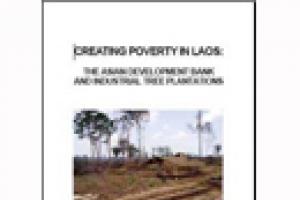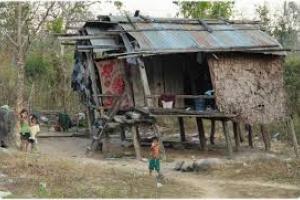When a forestry operation is certified under the Forest Stewardship Council system, it should mean we can all relax in the knowledge that the forests are reasonably well managed. Unfortunately, it seems, this is not the case. SmartWood, an FSC accredited certifier, recently certified forestry operations in Laos which are producing timber that is illegal under the Lao Forestry Law.
Laos
Bulletin articles
6 May 2006
"We want to hold accountable those companies that built or profited from the dam - the Korean company that built it or the Belgian company that owns the dam now. There should be letters sent saying, 'You are making money from this, why don't you take some responsibility and help all those people impacted by this project - allow them to move back?' We need to have enough land for us to be able to farm, which means moving to areas we consider our old territory, and we need to be given the right to live there with self respect and independence."
Publications
25 April 2006
By Chris Lang and Bruce Shoemaker.
Contents:
· Background: Forests and Rural Communities in Laos
· The Failure of the ADB’s First Plantation Project in Laos
· The ADB’s New Plantations Project in Laos: Repeating the Same
Mistakes?
BOX: The impacts of industrial tree plantations are being increasingly felt by rural communities. Eyewitness reports describe some of these impacts.
· Conclusion
Other information
7 March 2006
For over a decade a network of interests has been pushing industrial tree plantations in Laos. The key organisation is the Asian Development Bank. In 1993, the Lao government approved a Tropical Forest Action Plan (TFAP), carried out with funding from the ADB and the World Bank, among others. The TFAP recommended logging the forests and establishing industrial tree plantations on degraded forest land.
Bulletin articles
8 February 2006
It's official. The Asian Development Bank's Industrial Tree Plantations Project in Laos has increased poverty. In a December 2005 report, the Bank's Operations Evaluation Department (OED) concludes that the project "failed to improve the socioeconomic conditions of intended beneficiaries, as people were driven further into poverty by having to repay loans that financed failed plantations."
Bulletin articles
12 October 2005
A massive restructuring of Lao society is currently taking place. Over the last decade, the Lao government has moved tens of thousands of Indigenous Peoples from their remote upland homes to lowland areas and near roads. While the government's programmes are aimed at "poverty alleviation" and "development", the impacts on the resettled communities' livelihoods, food security and environment have often been devastating.
Bulletin articles
14 August 2005
Like many other Indigenous Peoples, the Katu in Laos depend on the forests for their livelihoods. Living in the heavily forested Annamite Mountains near the Vietnamese border, the Katu in Laos practise shifting cultivation and hunt and gather much of their food, fibres, medicines and building materials in the forest. Until recently, that is.
Bulletin articles
15 June 2005
When the World Bank approved US$270 million in grants and guarantees for the controversial one thousand megawatt Nam Theun 2 (NT2) hydroelectric dam in Laos on 31 March of this year, most of its Directors were convinced that the project’s economic benefits outweighed its environmental and social downsides.
Bulletin articles
20 April 2005
Back in 1989, when Australian company Snowy Mountains Engineering Corporation was hired to produce a World Bank-funded feasibility study of Nam Theun 2 hydropower dam, the project under study was a dam to generate electricity for export to Thailand.
Bulletin articles
21 March 2005
On 31 March 2005, the World Bank's Board of Directors will decide whether to support a series of loans and guarantees for the Nam Theun 2 hydropower dam in Laos.
Other information
24 December 2004
by Phetsavanh Sayboualaven
1) Introduction
Bulletin articles
29 July 2004
The March-June edition of the magazine "Watershed" focuses on the issue of tree plantations in Cambodia, Laos, Thailand and Vietnam as part of the broader picture of the spread of industrial tree plantations in the South.
This edition of Watershed is the result of a collaborative effort between a large number of individuals and organizations --mostly from within but also from outside the Mekong region-- concerned over the social and environmental impacts resulting from large-scale tree monocultures.


